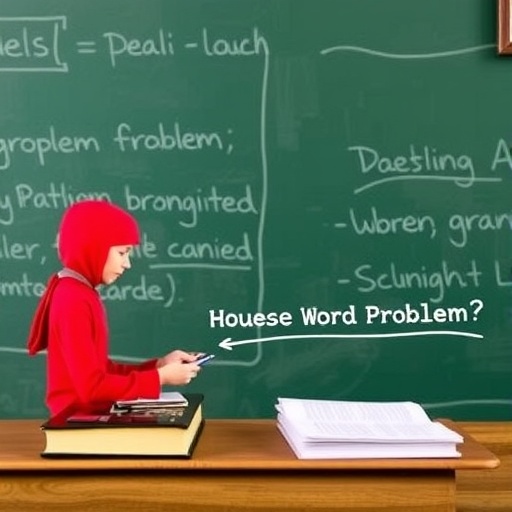A recent systematic review and network meta-analysis conducted by Peng et al. has delved into the intricate world of mathematical problem-solving strategies, specifically focusing on the effectiveness of word-problem strategies and their combinations. In the realm of education, particularly in the teaching of mathematics, problem-solving plays a pivotal role in fostering critical thinking and heuristic skills among students. The ability to navigate through word problems effectively is not merely an academic skill; it encompasses a range of cognitive strategies that, if effectively cultivated, can lead to improved educational outcomes.
Word problems can often be daunting for students, as they require the translation of textual information into mathematical expressions and operations. This transformative cognitive process involves various skills, including comprehension, logical reasoning, and mathematical application. Through the meta-analysis conducted by Peng and colleagues, the researchers sought to assess different strategies employed in tackling these problems, evaluating their effectiveness in various educational settings and contexts.
Peng and their team meticulously analyzed existing research to create a comprehensive picture of how different strategies perform in educational contexts. The study brought to light the various standalone strategies—such as visualization, story mapping, and the staging of questions—as well as hybrid strategies that combine two or more approaches. The significance of hybrid strategies was particularly emphasized, as they offer a multifaceted approach to problem-solving that can cater to diverse learning styles.
One of the key findings of the meta-analysis was the effectiveness of strategy combinations over isolated methods. When students engaged in using both visual representations and structured problem-solving methodologies, their success rate in correctly solving word problems increased significantly. This revelation resonates deeply with educators who have long advocated for differentiated instruction tailored to diverse learner needs. It further reinforces the notion that flexible thinking in mathematics can enhance student engagement and comprehension.
For educators and school administrators alike, the data derived from this study provides invaluable insights into instructional design. Understanding which strategies can be combined effectively to improve student outcomes allows for a more strategic approach to curriculum development. By integrating successful word-problem strategies into everyday lesson plans, educators can create an environment where students not only learn mathematics but also develop resilience and adaptability in their problem-solving approaches.
Furthermore, the review revealed the necessity for professional development and training among teachers on these identified strategies. Educators must be equipped with the knowledge and skills needed to implement these strategies effectively in classrooms. Continuous professional development ensures that teachers are not only aware of the latest educational research but are also adept at applying these strategies in practice, making them champions of effective teaching methodologies.
Another noteworthy point highlighted in the study was the role of assessment. Traditional assessments often focus solely on final answers, which misses the opportunity to evaluate students’ reasoning processes and strategy application. By developing assessment tools that emphasize strategy use, educators can gain better insight into students’ understanding and reasoning, informing future instruction and intervention strategies.
The findings also raise questions about the applicability of these strategies across various age groups and educational backgrounds. As the research continues to unfold, it will be essential to conduct further studies that investigate these strategies’ effectiveness across diverse populations, including students with learning disabilities and those for whom English is a second language. Understanding how these factors influence strategy effectiveness will be crucial for developing inclusive educational practices.
Moreover, Peng et al.’s comprehensive analysis has the potential to spark further research into other areas of mathematics education, beyond word problems. The integration of technology in problem-solving strategies is one such area ripe for exploration. As digital tools increasingly become part of the educational landscape, investigating how they can enhance traditional strategies or contribute to new hybrid methods could yield significant benefits for contemporary classrooms.
The implications of this research extend beyond the classroom. Enhanced problem-solving abilities have far-reaching effects on students’ overall academic success and can lead to increased self-confidence and a positive attitude toward mathematics. Buildings of knowledge constructed through effective problem-solving strategies serve as a foundation for future learning, reinforcing the importance of early engagement in mathematical practices.
Through this systematic review and network meta-analysis, Peng and their team are not merely contributing to academic discourse; they are challenging educators to rethink their approach to teaching mathematics, urging them to consider the unique needs of their students and to explore the intricate relationships between various problem-solving strategies. This work adds a valuable layer to our understanding of pedagogical effectiveness in mathematics education, positioning it as a critical area for ongoing inquiry and innovation.
In summary, the exploration of word-problem strategies and their combinations provides a robust framework that underscores the importance of strategic and flexible problem-solving approaches in mathematics education. As we continue to unravel the complexities of effective teaching strategies, the findings from Peng et al. offer a beacon of hope for both students and educators striving for excellence in learning outcomes.
Subject of Research: Effectiveness of Word-Problem Strategies and Strategy Combinations in Mathematics Education
Article Title: Exploring the Effectiveness of Word-Problem Strategy and Strategy Combinations: A Systematic Review and Network Meta-Analysis
Article References:
Peng, P., Liu, Y., Li, S. et al. Exploring the Effectiveness of Word-Problem Strategy and Strategy Combinations: A Systematic Review and Network Meta-Analysis.
Educ Psychol Rev 37, 81 (2025). https://doi.org/10.1007/s10648-025-10057-9
Image Credits: AI Generated
DOI: 10.1007/s10648-025-10057-9
Keywords: Word Problems, Problem Solving Strategies, Strategy Combinations, Mathematics Education, Systematic Review, Network Meta-Analysis




